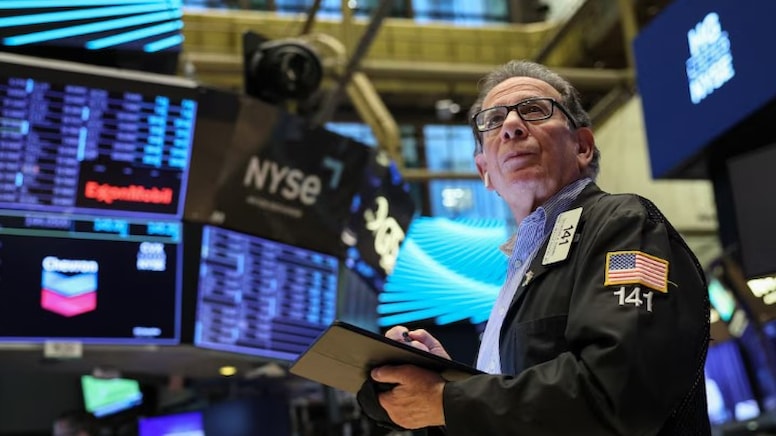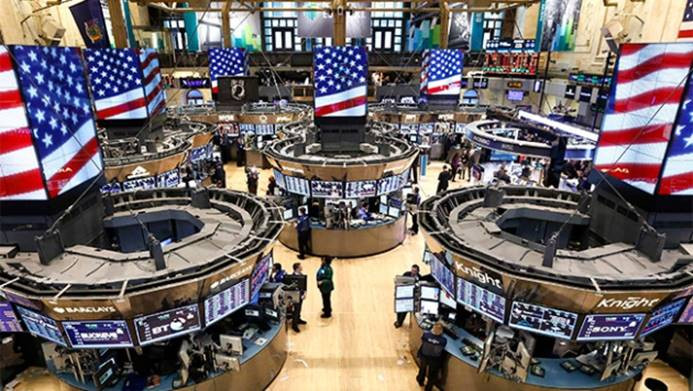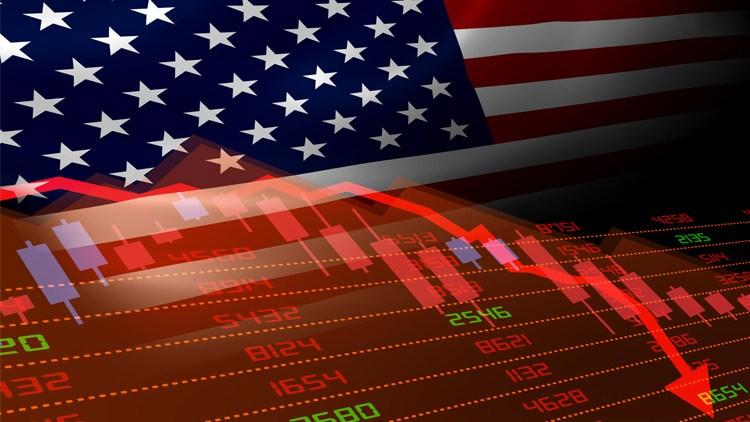Fed and Israel shake-up in stock markets
Global markets followed a mixed course this week, with concerns that tensions between Israel and Iran could escalate further and uncertainties about the US Federal Reserve's (Fed) future policies, while US stock markets saw sharp declines. 
Question marks over the US Federal Reserve's (Fed) roadmap to fight inflation are already weighing on asset pricing, while the lack of tension in the Middle East is causing risk perceptions to rise significantly.
Following Fed Chairman Jerome Powell's hawkish verbal guidance, concerns have increased that the bank will not start cutting interest rates anytime soon.
Powell signaled in his remarks that the latest data could keep the policy rate higher for longer than expected. Stating that recent data show that it will probably take longer than expected to reach the confidence they are looking for, Powell pointed out that if high inflation continues, they can maintain the current level of restrictions as long as necessary.
Analysts stated that investors acted cautiously after both the data released in the US and Powell's hawkish verbal guidance, and that the high level of tension in the Middle East continues to be another factor dampening risk appetite.
In money markets, after Powell, the probability of the Fed starting to cut interest rates is priced at 16 percent in June, 41 percent in July and 65 percent in September.
On the other hand, in the Beige Book report published by the Fed, it was reported that the general economic activity in the country has increased "slightly" since the end of February. The report stated that the economic outlook was cautiously optimistic and that upside risks to short-term inflation in both input and output prices were perceived in several regions.
Analysts stated that the labor market in the US remained resilient and the cautious attitude of Fed officials continued.
Accordingly, New York Fed President John Williams stated that he did not think there was an urgent need for a rate cut and that rate cuts would be determined according to economic activity.
Atlanta Fed President Raphael Bostic also stated that inflation will return to target more slowly than expected and that they are not in a hurry to cut interest rates.
In addition, the International Monetary Fund (IMF) reported that near-term financial stability risks have receded and there are fewer downside risks to global growth next year, warning, "However, the final phase of disinflation may be complicated by several financial vulnerabilities that stand out in the short term."
On the other hand, the American media, citing US officials, reminded that Israel organized an attack on Iranian territory. Iranian media also reported that explosions were heard in the northeast of Isfahan province, home to the Iranian Air Force Base.
While these developments have raised concerns that tensions between Israel and Iran may escalate further, the news flow on the issue has been in the focus of investors.
While the macroeconomic data releases in the US continue to spread the Fed's projections over a wider time horizon, the potential impact of the tension in the Middle East, especially on commodity prices, continues to fuel uncertainties.
While the global fight against inflation still has a long way to go, it is feared that the tensions in the Middle East will increase the volatility in commodity prices and support inflationary pressures. In addition, concerns that further escalation in tensions between Israel and Iran may affect the steps to be taken by central banks are seen as another factor that complicates pricing.
BONDS, DOLAR, OIL, GOLD
With these developments, the US 10-year bond yield ended the week at 4.6260 percent, up 10 basis points.
The dollar index also ended this week at 106.1, just above last week's level.
Expectations that economic activity will remain strong across the world continued to support copper prices, while the pound of copper, which hit a 2-year high of $4.51, ended the week at $4.48, up 4.6 percent.
The price of Brent oil decreased by 3.4 percent to $ 86.6 a barrel after tensions in the Middle East decreased and US oil stocks came in above expectations.
The ounce price of gold also increased by 2 percent on a weekly basis to 2 thousand 392 dollars, with the tension in the Middle East supporting the search for safe havens.
SALES ON THE NEW YORK STOCK EXCHANGE
The New York Stock Exchange followed a sales-heavy course this week as expectations that the Fed will continue its cautious stance in the markets strengthened with the macroeconomic data released.
Industrial production in the US increased by 0.4 percent on a monthly basis in March, in line with market expectations. The capacity utilization rate in the country increased by 0.2 points to 78.4 percent in the same period, while remaining 1.2 points below the long-term average.
While the number of new houses started to be built in the USA was realized below market forecasts with 1 million 321 thousand and the number of construction permits issued with 1 million 458 thousand in March, housing starts in the country recorded the lowest levels in 7 months and construction permits in 8 months.
In the US, the Philadelphia Fed Manufacturing Index rose to 15.5 in April, the highest since April 2022.
The index, which came above market expectations, signaled that the expansion in the sector continued by taking a positive value for the third consecutive month. Second-hand home sales in the country fell below expectations with a 4.3 percent decrease in March.
On the corporate side, Goldman Sachs, which published its balance sheet, reported that its revenue increased by 16 percent and net profit by 28 percent in the first quarter. The bank's shares gained 3.7 percent this week after financial results that exceeded market expectations.
Shares of Tesla, the US electric vehicle manufacturer, fell 14 percent this week after news that it will lay off more than 10 percent of its employees.
While Samsung surpassed Apple with a 20.8 percent market share in smartphone sales on a global basis, Apple shares fell 6.5 percent.
However, as the calendar continued to intensify during the balance sheet season in the US, shares of Morgan Stanley, Bank of America and Johnson & Johnson gained 5.2 percent, 3.3 percent and 0.3 percent, respectively.
With these developments, the Nasdaq index on the New York stock exchange lost 5.52 percent, the S&P 500 index lost 3.06 percent, while the Dow Jones index increased by 0.01 percent.
Next week, manufacturing industry Purchasing Managers Index (PMI), new home sales, Richmond Fed industrial index, durable goods orders on Wednesday, growth, wholesale inventories, weekly unemployment benefit applications on Thursday, personal income and expenditures on Friday, University of Michigan consumer confidence index will be followed.
MIXED TREND IN EUROPEAN STOCK MARKETS
European stock markets followed a mixed course this week.
Statements of central bank officials stood out in Europe this week.
European Central Bank (ECB) President Christine Lagarde stated in an interview at the Spring Meetings of the International Monetary Fund (IMF) and World Bank that they are moving towards a more moderate tight monetary policy.
Lagarde said, "We observe that there is a disinflation process that is progressing according to our expectations. We need to build a little more confidence in this disinflation process, but if it moves according to our expectations and we don't have a big shock, we are moving towards a more moderate tight monetary policy." Lagarde also said it was too early to review the bank's inflation target.
ECB member Bostjan Vasle said that if everything goes as planned, rates could be close to 3 percent by the end of the year, while another bank member Mario Centeno said that even after the ECB cuts interest rates twice, it will still put pressure on the economy, but there should be no rush to lower borrowing costs.
"We are not pre-committing to a specific interest rate path," ECB Chief Economist Philip Lane said, adding that they will continue to follow a data-dependent and meeting-to-meeting approach to determine the appropriate level and duration of tightening.
On the other hand, the Euro / dollar parity ended the week at 1.0660, up 0.2 percent.
Bank of England (BoE) Governor Andrew Bailey said in a statement within the scope of the Spring Meetings of the International Monetary Fund (IMF) and the World Bank that he expects inflation in the country to approach the BoE's target of 2 percent next month.
While the Consumer Price Index (CPI) in the Eurozone was realized in line with expectations with an annual increase of 2.4 percent in March, inflation in the UK in the same period came in above the forecasts with 3.2 percent.
The realization of the inflation data announced in the Eurozone in line with market expectations was among the important factors that increased the risk appetite in Europe.
With these developments, the DAX index in Germany and the FTSE 100 index in the UK lost 1.08 percent and 1.25 percent, respectively, while the MIB 30 index in Italy and the CAC 40 index in France gained 0.46 percent and 0.14 percent, respectively.
Next week, consumer confidence index in the Eurozone will be monitored on Monday, manufacturing industry PMI in the Eurozone and Germany on Tuesday, and Ifo business confidence index in Germany on Wednesday.
ASIAN STOCK MARKETS DECLINE EXCEPT CHINA
Selling pressure deepened in Asian equity markets due to the news on Israel and Iran.
While technology companies led the decline, Taiwan-based semiconductor company TSMC's downward revision of its future expectations despite reporting higher-than-expected revenues and profits yesterday was effective in the declining risk appetite.
In the meeting held by US Treasury Secretary Janet Yellen with the finance ministers of Japan and South Korea, the depreciation of the currencies of these two Asian countries was at the forefront. With these developments, the dollar/yen parity increased by 1 percent to 154.64 and the dollar/South Korean Won parity decreased by 0.5 percent to 1.374.23.
On the Chinese side, while the country's economy grew above expectations with 5.3 percent in the first quarter of the year, industrial production and retail sales increased by 4.5 percent and 3.1 percent annually, respectively, in March.
The data, which fell below expectations in the country, signaled that the slowdown in economic activity continued, strengthening expectations in the markets that the government will take new support steps to increase economic vitality.
Equity markets in China diverged positively as the Chinese government promised to tighten stock listing criteria, put an end to illegal share sales and strengthen control over dividend payments.
On the other hand, according to data released in Japan, CPI increased by 2.7 percent in March, in line with expectations.
With these developments, the Nikkei 225 index in Japan lost 6.21 percent on a weekly basis, the Kospi index in South Korea lost 3.34 percent, the Hang Seng index in Hong Kong lost 2.98 percent, and the Shanghai composite index in China gained 1.52 percent.
Tokyo CPI will be followed in Japan on Friday next week.









































